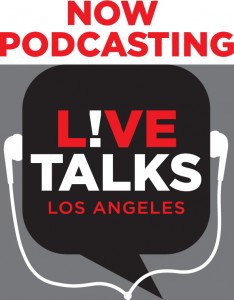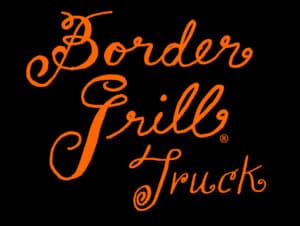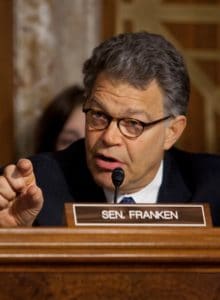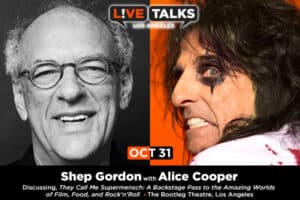Blog
New podcasts uploaded — 23 of them
 Twenty-three new podcasts uploaded! They are available for free via iTunes. Enjoy.
Twenty-three new podcasts uploaded! They are available for free via iTunes. Enjoy.
New podcasts feature Amy Tan, Patton Oswalt, Walter Isaacson, Robert Kirkman, David Frum, Jenifer Lewis, Marc Maron, Denis Leary, Dan Rather, Tim Ferriss, Chris Matthews, Russell Brand and more….
When Live Talks Los Angeles was launched in 2010, we made a commitment to make available an archive of all our events. We started with videos, and over 200 videos are available in our video channel on Vimeo. You can also see our videos on YouTube and also on Facebook.
Latest additions include:
* Amy Tan in conversation with Charmaine Craig
* Patton Oswalt in conversation with Clarissa Cruz
* Robert Kirkman in conversation with Jason Mantzoukas
* David Frum in conversation with Larry Wilmore
* David Cay Johnston in conversation with Terrence McNally
* Daymond John in conversation with Sam Rubin
* James Syhabout in conversation with Roy Choi
* Jenifer Lewis in conversation with D.J. “Shangela” Pierce
* Denis Leary in conversation with Peter Tolan
* Dan Rather in conversation with Larry Wilmore
* Dan Rather in conversation with Kareem Abdul-Jabbar
* Tim Ferriss in conversation with Terry Crews
* Tim O’Reilly in conversation with Krisztina Holly
* Chris Matthews in conversation with Frank Buckley
* Scott Adams in conversation with Terrence McNally
* Marc Maron in conversation with Brendan McDonald
* Walter Isaacson in conversation with Michael Lewis
* Russell Brand in conversation with Dr. Drew Pinsky
* Yotam Ottolenghi & Helen Goh in conversation with Amy Scattergood
* Daniel Goleman in conversation with Lisa Napoli
* Gretchen Rubin in conversation with Daniel Siegel
* Bryan Cranston in conversation with Sam Rubin
* Jason Calacanis in conversation with Shawn Gold
* David Litt in conversation with Matt Walsh
* Sen. Al Franken in conversation with Chelsea Handler
* P. J. O’Rourke in conversation with Adam Felber
* Ben Falcone in conversation with Melissa McCarthy
* Reza Aslan in conversation with Gotham Chopra
* Jami Attenberg in conversation with Cynthia D’Aprix Sweeney
* Colm Tóibín in conversation with Scott Timberg
* Charmaine Craig in conversation with Jane Smiley
* Sherry Lansing in conversation with Stephen Galloway
* Kareem Abdul-Jabbar in conversation with Bill Walton
* Jack Kornfield in conversation with Dan Siegel
Conversation….Community…. and a Nosh!
 Border Grill Food Truck will be onsite for two upcoming Live Talks Los Angeles events: David Mamet, Feb 26, and Patton Oswalt, Mar 5!
Border Grill Food Truck will be onsite for two upcoming Live Talks Los Angeles events: David Mamet, Feb 26, and Patton Oswalt, Mar 5!
You’ve asked for it—an inexpensive bite before a great conversation. Starting February 26th and at select LiveTalks Los Angeles events this spring we are making arrangements to have food trucks available before and after events. The BORDER GRILL food truck will be on site to serve up some of their fresh, famous modern Mexican cuisine at two upcoming events: Feb 26 for our David Mamet event at the Moss Theatre in Santa Monica and March 5 at our Patton Oswalt event at the WGA Theatre in Beverly Hills.
So you can plan in advance and whet your appetite, here’s a taste of what they’ll have available:
TACOS
on a fresh corn tortilla | add guacamole .75
> CARNITAS
slow roasted pork | shaved cabbage | serrano salsa | mexican cheeses 2.75
> CUBANO CHICKEN
tomatillo salsa | salsa fresca | crema 2.75
> STEAK
marinated grilled steak salsa | arbol | salsa fresca 3.75
> BAJA FISH
crispy beer battered fish | avocado creme | cabbage slaw | salsa fresco | aji amarillo aioli 3.75
> SWEET POTATO BLACK BEAN
chipotle salsa | caramelized onions | poblano peppers | grilled corn relish
pickled onions 2.75
QUESADILLAS
crispy flour tortilla | mexican cheeses
add guacamole 1.75 select one:
select one:
CARNITAS 8
STEAK 9
CUBANO CHICKEN 8
ROASTED POBLANO CHILES 8
SWEET POTATO BLACK BEAN 8
BURRITO OR SALAD BOWL
red rice | chopped romaine | mexican cheeses black beans | salsa fresca | grilled corn relish
add guacamole 1.75
select one:
CARNITAS 8
CUBANOCHICKEN 8
STEAK 9
BAJA FISH 8
SWEET POTATO BLACK BEAN 8
SIDES
CILANTRO GARLIC FRIES 4
RED RICE & BEANS 4
TORTILLA CHIPS & GUACAMOLE 5
SWEETS
DULCE DE LECHE CHURRO TOTS
cinnamon sugar | whipped cream 4
DRINKS
BOXED WATER 2
ASSORTED SODAS 2.50
Al Franken in the news. See him at Live Talks LA, July 8 with Chelsea Handler
 We’re excited to be hosting Senator Al Franken in conversation with Chelsea Handler on July 8th at the Alex Theatre. More info on the event is here.
We’re excited to be hosting Senator Al Franken in conversation with Chelsea Handler on July 8th at the Alex Theatre. More info on the event is here.
Here’a a round up of media his new book, Al Franken, Giant of the Senate, has garnered.
Q and A with Charmaine Craig, author of Miss Burma
What drew you to write this story?
I can’t remember a time when I wasn’t both intrigued and frightened by the myth of my mother and her native country, by their secrets and contradictions. My mother was generally quiet about the subject of her past in Burma, but I knew from my American father that she had been a beauty queen and famous actress, and that she had become a warrior when her first husband, of the same ethnic minority group, was slain. How could someone so modest—someone who called herself a pacifist, who professed to care mostly about mothering, and who taught me to cultivate inner beauty with a kind of single-mindedness that sometimes struck me as detrimental to my wellbeing—have willingly participated in those things? Why, when she mentioned the past, did she speak of her love for the same country that practiced a systematized form of ethnic cleansing—a country whose government had apparently put a price on my mother’s head? And why did it sometimes seem that my mother wanted to keep me in the dark about her personal and national history, almost as though I were unworthy of it? One of the principle purposes of fiction is to build and satisfy the same mystery that fills our human days: the mystery of others’ inconsistencies, of their potentially explosive mixed motivations. Writing the book was initially a way for me to be granted access to a conjured version of my mother’s consciousness and first country, both of which exerted pressure on my present life, but which I often felt shut out of.
For readers unfamiliar with Burmese history, could you provide a thumbnail sketch of the historical context in which your novel takes place?
My mother’s people are the Karen, one of Burma’s indigenous ethnic groups. For centuries, the Karen were enslaved by majority Burman rulers—a situation that, from the perspective of Karens, was resolved with the British conquest of the territories that formed modern Burma in the 1800s. Viewing the British as liberators, the Karen fought actively to help them gain and keep control of the region. The rising Burman call for independence was race-based, the predominant rallying cry being “Burma for the Burmans!” Then came the Second World War and the emergence of a Burman leader who would turn the pressure of the war into his people’s domestic opportunity. Father of the current de facto leader of the country, General Aung San underwent military training in Japan along with a group of young Burmans who called themselves “lords” and were collectively known as the “Thirty Comrades.” They formed the notorious Burma Independence Army, which fought alongside the Japanese in Burma and often employed genocidal tactics, targeting Karen civilians and brutally massacring Karen villages. Meanwhile, the Karen fought on behalf of the British, staging what some have called the Second World War’s most successful guerilla operation against the Japanese forces. When it became clear that the Allies were winning the war, Aung San switched his army’s loyalties. And then, to the shock of most Karens, the British pinned their hopes on him.
With Independence in 1948, Burman leadership instituted laws stripping minorities of their land, citizenship or other rights—something we see going on today. Some of these discriminatory policies stemmed from what was, even then, a pro-Buddhist agenda on the government’s part. Karens including my grandfather organized peaceful nationwide demonstrations calling for equity among all ethnic groups. Then on Christmas Eve of that same year, while the congregated inhabitants of two Karen villages were singing carols at midnight (many Karens are Christian), Burman policemen launched hand grenades into their church, fired on the survivors, and torched every last structure. Hundreds more Karens were soon murdered, and on January 30, following an appeal by the Karens to dialogue with the government, shots were fired across my family’s property. With those shots, the longest running civil war in recorded history began.
MISS BURMA draws heavily from the compelling life stories of your grandparents and your mother. Why did you choose fiction over biography or memoir to tell their stories?
While it became increasingly important to me to set the historical record straight, to track the geopolitical movements that gave rise to Burma’s military dictatorship and its ongoing waves of genocide, I never wanted merely to restore the past with this book. I am a fiction writer, and so much more interested in unresolvable questions—in those of meaning and value—than in “facts” or information. I am also deeply committed to the form of the novel. In an artful, Aristotelian sense, I wanted to create a possible world distinct from the world of history and my family—a world, I hope, in which the moral principles and psychological insights arrived at are, if not immutable and timeless, more universal or human than relativist; and a world to whose characters we are granted access as we couldn’t possibly be in biography. To make a leap into another’s subjectivity is difficult if not impossible even when we’re in the closest relationship with another human. But we can know beautifully drawn fictional characters—know them intimately, in body, soul and mind—and that intimacy is one of the chief consolations and pleasures of fiction.
Was it difficult to convince your mother to talk about her life and her family history?
I spent two years interviewing my mother in preparation to write the novel. This was some time before she died. On the one hand, she was supportive of the project and went along with my line of questioning. Yet her answers clung to surfaces. She could tell me of events, but when the subject turned to what those events had done to her internally, she spoke sparingly and with difficulty. By the end of the interview process, I had received a sort of rough possible plot for the novel, but that plot could be written in five or ten pages; missing from it were human drives—lust and outrage and the quest for meaning and the tangle of motivations that had caused my family members to fling themselves at history. I left the interviews with a clearer understanding of one thing especially: my mother had survived trauma by rarely looking back or inward; if she was a mystery to me, she was also a mystery to herself.
Beyond conversations with your mother and family, what was your research process like?
Western scholarly treatments of Burma’s history and peoples tend toward inaccessibility (and frequent inaccuracy)—in part because the multiplicity of peoples adds a certain complication, and in part because the record of those peoples has largely been effaced. What puzzled me was the gap between what I’d learned from family members about American involvement in Karen affairs (for example, that my mother’s first husband had been in discussions with the CIA) and the general absence in scholarly literature of information about this. I began to turn to declassified CIA and State Department records in order to corroborate family suppositions, and what I found was deeply upsetting: while certain records suggest that elements of the CIA were, in fact, helping pro-democratic groups including the Karen, other records suggest that the United States was assisting the Burmese government in its efforts to “liquidate” those same resistance groups. Well, I wasn’t going to write an academic treatise on all of this, but I could exert my freedom to put it all down imaginatively in fiction. Part of the novel very naturally became a kind of political mystery: thrust into a state of dark isolation in house arrest, the character of my mother’s father exerts his last remaining freedom—that of consciousness—and struggles to piece together theories about the larger geo-political forces pushing the peoples of Burma toward and away from oppression.
Your mother was a beauty pageant queen who found her true calling in politics, and you are a former actor in film and television who found your true calling in literature. There seems to be a correlation there. Can you talk a bit about that?
As my mother did, I greatly value privacy. And I share her sense that modesty is fundamental to dignity. By this, I don’t mean to say that she had a low opinion of herself; rather, her opinion of her worth was significant enough that she didn’t need a constant stream of recognition and praise. I think it’s true that she never considered herself “beautiful;” it would have been repellent to her to objectify and idealize herself that way. She endured the pageants as she endured her later political work: both were her duty, though the latter was considerably more dignified. I came to acting and literature for more selfish reasons: because, for as long as I can remember, I have been called to take the place of others empathically, to create art out of meditation on the human condition. It’s a strange thing to be an actor when one values privacy and modesty. In “Hollywood,” I was lucky to receive a couple of leading roles (my young daughters particularly and immodestly enjoy my having played the live-action reference for the character Pocahontas during the making of the Disney animated feature). In the end, I left that life because the parts for which I was being considered mostly trucked in stereotypes and embarrassed me, and because the first thing that happens in a casting room when you are a young woman is that you are sized up physically, if not racially. I have been much happier in the freedom and relative obscurity of my writing life. I suppose, like my mother, I have discovered a more dignified way to shine a light on that which is hidden, though my service isn’t as obviously altruistic.
MISS BURMA is both a love story and political novel. Did you find it difficult to balance those narrative strands?
Ah, yes. It was only with a sort of defeat that I finally included political material in the novel. If I could have assumed that my audience knew something about Burmese history and politics, and if Burma’s ethnic makeup were not so complex, I would have been able to treat revolution in the novel in a more gestural way (as in Pasternak’s Zhivago), or I could have evoked ethnic tensions without delving into their sources (as in Coetzee’s Disgrace). But that wasn’t my fate. I had to accept the requirements of telling this story; and that meant not only going through a lot of trial and error with regard to how much politics to put in the book, but also discovering how those politics were tied to the characters’ fate. One of the ways we keep fiction from feeling impoverished is by refusing to be reductive in it. Popular culture pressures us to represent ourselves and our views without paradox, but that’s not life. Life is gorgeous and desolating, communal and isolating, poetic and pedestrian; and the tectonic forces of history and politics are at once impersonal and surcharged by outsized personalities. Fusing the political and the passionate, the public and the private, or finding their intersections, was challenging and important to what the narrative ultimately became. In the end, my long process was one of evoking layers within beings whose private, sometimes disturbing perceptions and yearnings drove them to act heroically during appalling times.
I know you are an activist for inclusivity in Burma and involved in the fight against the persecution of ethnic minority peoples, including the Karen. What do the next few months hold in store for the region?
Much of what the next months hold in store for Burma is what can be seen in Burmese history (and in the novel, I might add). It could be said that this is a time of tremendous change in the country, with Aung San Suu Kyi—historically, a figurehead for democracy—seated at the head of the government. But it is also a precarious time. The Burmese civil war has essentially gone on since 1949, with the Burma Army recently attacking Shan and Kachin territories (the Shan and Kachin are two of Burma’s ethnic nationalities). The government argues that the civil war is over and has begun to label as “terrorists” those groups now defending themselves against military assaults. In the West, we’ve seen a lot of news about the plight of the persecuted Rohingya people, a Muslim minority, who have been suffering what many other ethnic groups in Burma have been experiencing for generations. The world is beginning to wonder if Aung San Suu Kyi is more aligned than expected with the military in its desire to keep a tight grip on centralized and ethnic-majority power. The next few months will be critical to the peace process, and trust building will be essential. There must be a cessation of the hostilities if the minority peoples are to believe that the peace negotiations are more than a charade. And there must be a resolution to the abominable and escalating Rohingya problem. In March 2017, the Karens will hold elections, postponed in consideration of the ongoing peace negotiations and tenuous National Ceasefire Agreement, which many Karen leaders are striving to support in spite of recent Burma Army breaches. Sadly, during this time of largely unreported turmoil, domestic and foreign business interests, encouraged in part by U.S. policies, will no doubt continue to increase their efforts to stake out locations for resource harvesting in mostly minority areas now controlled by the Burma Army.
Parking info for Andy Cohen event at Barnum Hall, Santa Monica
We expect a big audience for our event with Andy Cohen in conversation with RuPaul, so plan on arriving early. You can begin checking in at 6:45pm.
Doors to the theatre open at 7:15pm and we start at 8pm.
Parking is available in the lot and structure listed below.
According to the City of Santa Monica website, parking rates are as follows:
First 30 minutes…Free
Next Hour…$1.00
Each additional 30 minutes: $1.50
— Civic Center Parking Lot at the corner of 4th Street and Pico Blvd.
Access to the parking lot is via Main Street or 4th Street
— Civic Center Parking Garage, at corner of 4th Street and Civic Center Way
— There is limited parking for those with handicapped parking permits in the Olympic parking lot and Barnum parking lot.
There is a Walkway off of 4th street, next to the Double Tree Hotel that has direct access to the Santa Monica High School campus. Look for direction signs and attendants providing directions.
It’s Halloween, Come in costume to our event with Shep Gordon and Alice Cooper
 Our Shep Gordon/Alice Cooper event is on Halloween, October 31. Those attending are encouraged to come in costume to the talk at the Bootleg Theatre and we will have a prize for the best costume.
Our Shep Gordon/Alice Cooper event is on Halloween, October 31. Those attending are encouraged to come in costume to the talk at the Bootleg Theatre and we will have a prize for the best costume.
Here are the rules:
1. Must meet public decency standards, i.e. if you could get arrested dressed like that in public, not eligible.
2. Like all matters of opinion, it will be decided on Facebook.
3. You will be photographed, and the people will vote. All photos will be posted Nov 1 in an album on the Live Talks LA Facebook page, and a “like” constitutes a vote. Voting will be open till Election Day, Nov 8, 8pm.
4. By entering the best costume challenge, you agree to accept the outcome of the process.
5. While awaiting to be photographed, it is not permissible to hover around, pace, sigh, make faces, interrupt or otherwise try to intimidate a fellow contestant.
6. Elaborate entries that may involve 2 persons or more as an entry, are allowed, however, if selected as a winner, the prize is shared among the team.
7. There will be 10 honorable mentions, who will receive a signed book (of your choice) from an upcoming Live Talks Los Angeles event or past event.
8. The mere suggestions that the process of selecting a winner is rigged is grounds for disqualification.
www.livetalksla.org
